In this article, I will look at AI for research and suggest some of the most effective tools that can be used to support researchers in their search for knowledge. These types of software are designed with numerous features created to make scientific investigations faster and easier. They include text mining, natural language processing (NLP), advanced data analysis, predictive modeling etcetera.
With artificial intelligence, scientists can find hidden patterns in large datasets or gain new insight from literature thereby speeding up discovery in different fields of study. Whether it’s automating literature reviews; helping with experimental design; or enabling collaboration among peers – AI has changed everything about how we do science!
What Is An AI Tool for Research?
An AI tool for research is a software program that uses artificial intelligence to help with scholarly work. These applications have many different functions which can range from natural language processing (NLP) algorithms parsing and summarizing large volumes of texts, to machine learning models examining complicated data sets.
They support scientists in literature review, hypothesis testing, knowledge discovery among other tasks related to their field. Therefore, by doing routine jobs automatically; finding useful information buried within mountains of it;
Enabling teamwork between different scientific disciplines through collaborative platforms- these tools make researchers more productive than ever before thus leading to breakthroughs in various fields of science.
Here Is List of Best Ai For Research
- QuillBot
- Bit AI
- Scite
- PDFgear Copilot
- Consensus
- Connected Papers
- Litmaps
- Jenni
- Paperpal
- Research Rabbit
Best Ai For Research
1. QuillBot
QuillBot is one of the best AI tools for research, which provide a powerful platform for scholars to enhance their academic work. QuillBot makes generating high-quality summaries, paraphrases, and rewrites of complex texts easier thanks to advanced natural language processing (NLP) capabilities.
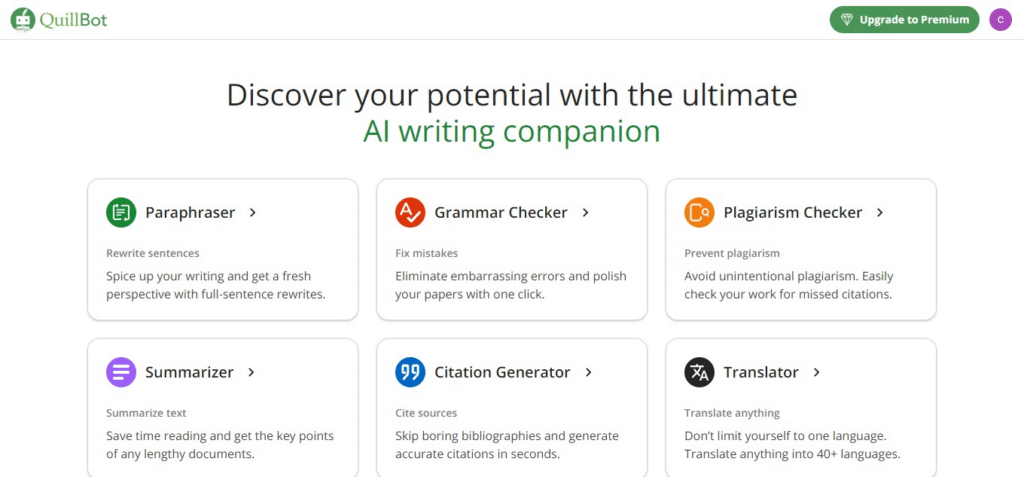
Lengthy documents can be condensed by researchers in an efficient manner where they extract important information as well as see various perspectives about a subject easily. This software has also been designed with a user-friendly interface that is intuitive having features which are accessible even by non-tech-savvy individuals; thus enabling people from diverse backgrounds engaged in scholarly activities express themselves better while speeding up their investigations too.
QuillBot can be used as a valuable assistant during literature reviews, editing research papers or when trying out new lines of thought because it helps researchers tap into the potential offered by artificial intelligence in their studies.
2. Bit AI
Bit AI is among the leading artificial intelligence tools for scientists, with a flexible platform that aims to optimize many parts of the research process. Through strong natural language processing (NLP) capacity, it allows scientists to rapidly analyze large amounts of text and pull out main ideas and patterns.
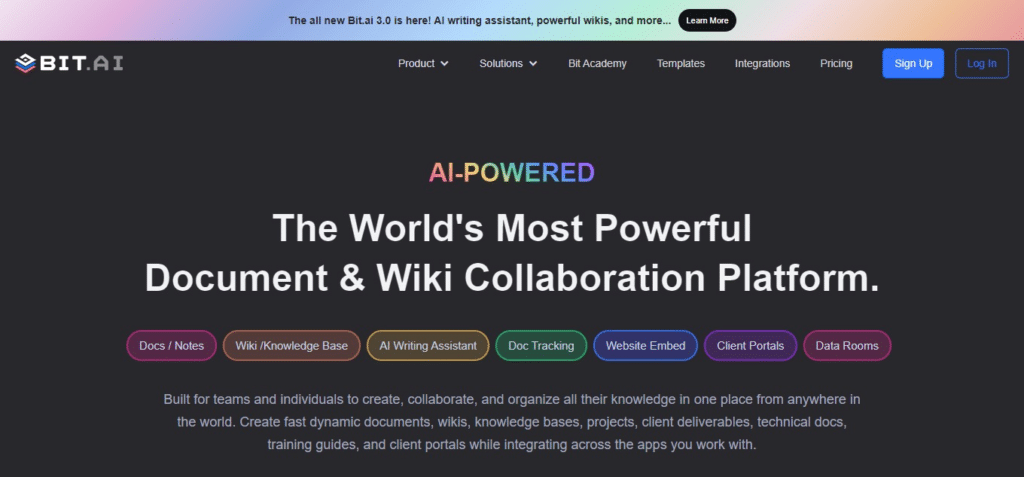
This tool enables researchers’ literature reviews to be done quickly and helps them summarize their findings while also finding resources relevant to their work. Additionally, its interface is easy and customizable for any researcher’s needs as well as promotes seamless collaboration between them by providing insights from data in an understandable format.
Bit AI doesn’t just stop at analyzing datasets or generating hypotheses; it gives researchers everything they need in order to do better science faster – whether that means communicating results more effectively or coming up with new experiments on-the-fly.
3. Scite
Scite arises as a top AI tool for researchers by creating robust systems that change the way scholars interact with scientific literature. It lets them know whether keeping up with previous work is worthwhile using innovative citation analysis technology.
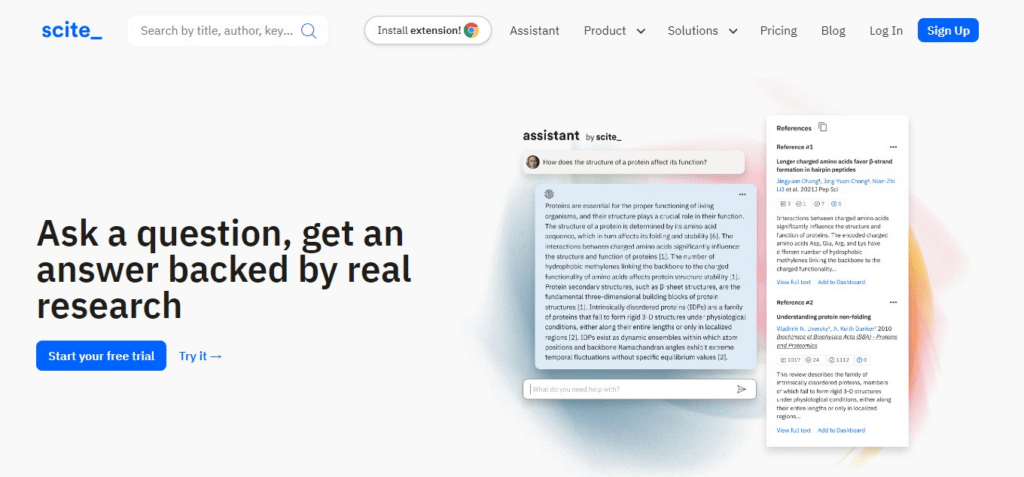
Scite, among other things, helps to spot fake news through real-time examination of the citations’ reliability and pointing out relevant studies quickly. Researchers at any level can use it because its interface is user-friendly while having intuitive features that are easy to grasp.
Scite aids in verification of references, identification of influential research works and tracking citation trends which are necessary for remaining current in one’s area of study hence invaluable to any serious researcher.
4. PDFgear Copilot
PDFgear Copilot is a notable artificial intelligence (AI) system for scholars as it provides an all-in-one solution for managing and analyzing academic papers. This technology is able to recognize important data from PDFs by itself which allows researchers to collect materials faster.
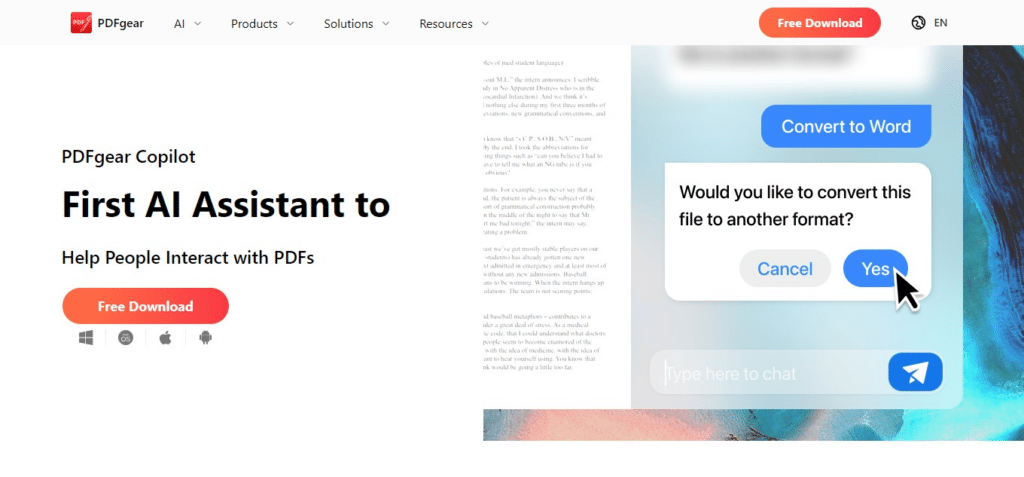
It makes things like literature review, data synthesis and information retrieval easier by turning PDF files into structured content seamlessly. The user interface of this program is easy to navigate and has many customizable features that can be tailored specifically for researchers’ needs; it also enables them to organize, annotate and analyze their study materials more effectively.
In addition, when doing systematic reviews or meta-analyses where large amounts of information need to be processed quickly — PDFgear Copilot could greatly speed up work efficiency in such cases as well.
5. Consensus
As a breakthrough peer review system, consensus has been considered as the best AI tool for scientists. Consensus is designed with state-of-the-art technology which can change the process of reviewing articles forever.
It makes use of advanced machine learning algorithms to automate and optimize many different areas in publishing an academic paper such as choosing who should review it and what criteria they need to meet while evaluating it.
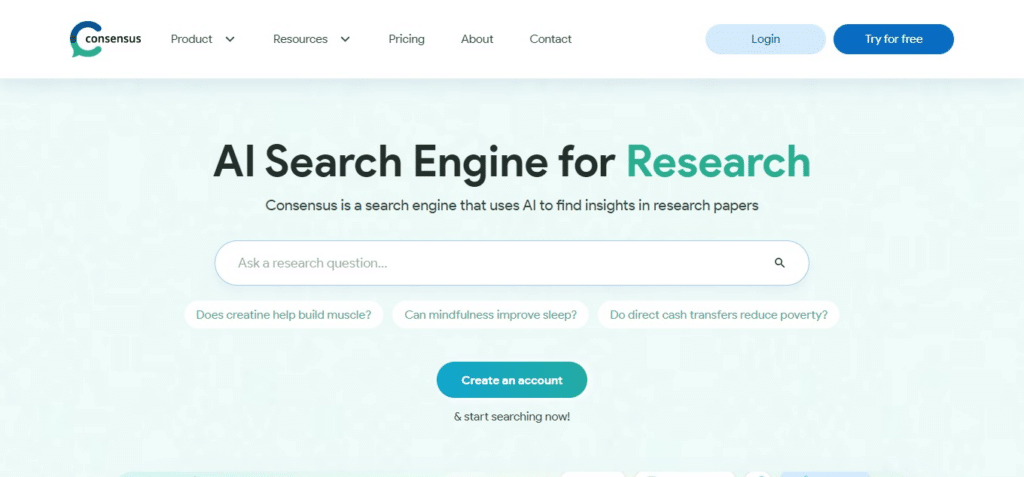
By doing this through AI analysis, it ensures fairness and speediness throughout the timeline of reviews. What’s more is that consensus provides an easy-to-use interface where authors can collaborate with reviewers or editors seamlessly based on their intuitive features thus creating efficiency in research transparency.
Whether one is submitting manuscripts, reviewing submissions or managing editorial workflows; there is no doubt that using consensus will revolutionize quality control measures within scholarly communication channels
6. Connected Papers
Connected Papers is an amazing AI tool for researchers because it provides a new way to see and explore connections between scientific papers. Through the use of complex algorithms, this software allows users to detect hidden relationships and track down important works that may have gone undiscovered otherwise;
it’s like having X-ray vision for your research process! With its citation network visualizations, Connected Papers gives insight into how fields have grown over time by showing what articles were cited most frequently as well as least often connected within different clusters or subfields of study.
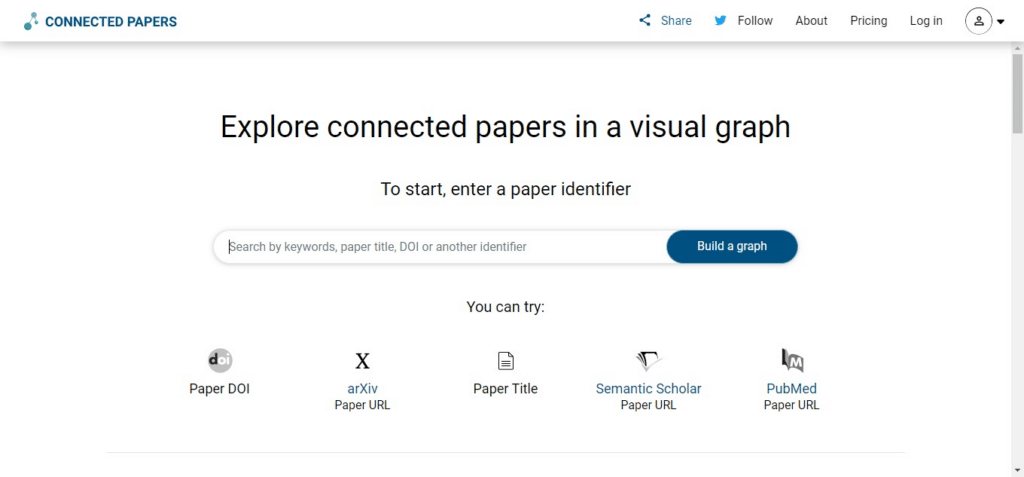
In addition to being visually appealing, these graphics are also interactive meaning that viewers can click on any node (representing an individual paper) in order to reveal more information about that particular document such as who wrote it or where it was published. This feature alone could save countless hours spent scrolling through lists of references trying desperately to find something relevant – just click once and all will be revealed!
The user interface is incredibly intuitive even for those with little technical knowledge; simply type in keywords related to what you’re looking for and watch as the program generates a beautiful map filled with colourful nodes representing different papers connected by their citations. Whether you’re writing a thesis, working on a grant proposal or just curious about the history of your field, Connected Papers has got you covered.
7. Litmaps
Litmaps is a powerful AI tool for researchers that provides an intuitive platform for revolutionizing the way scholars navigate and delve into academic literature. It’s designed to enable those using it generate dynamic visualizations of research topics, trends and relationships through the use of advanced natural language processing algorithms (NLP).
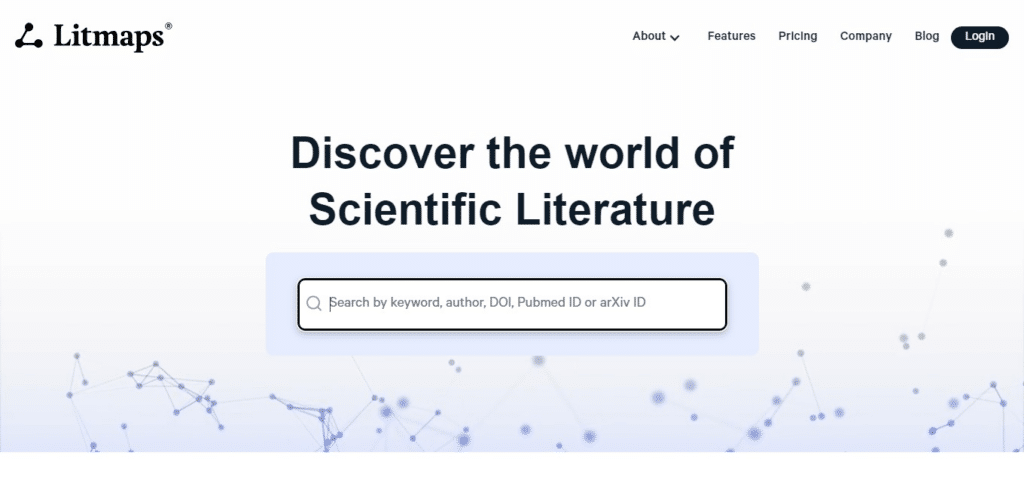
Semantic connections between scholarly articles are mapped by Litmaps thereby giving users insights on how knowledge domains are structured and changes over time. The ease-of-use interface together with customizable characteristics foster seamless discovery & exploration which makes people find out new things easily hence empowering them to also recognize gaps in research as well as keep themselves updated with what’s happening within their disciplines.
This being the case whether one is doing literature reviews, brainstorming about research ideas or working together with colleagues on a project; Litmaps becomes an invaluable resource towards improving efficiency among investigators while promoting scientific inquiry at large.
8. Jenni
Jenni is an extraordinary research AI tool as it offers a unified system that seeks to improve each step of the research process. Jenni employs advanced natural language processing (NLP) algorithms to enable fast summarization and extraction of insights from academic papers and documents during literature reviews.
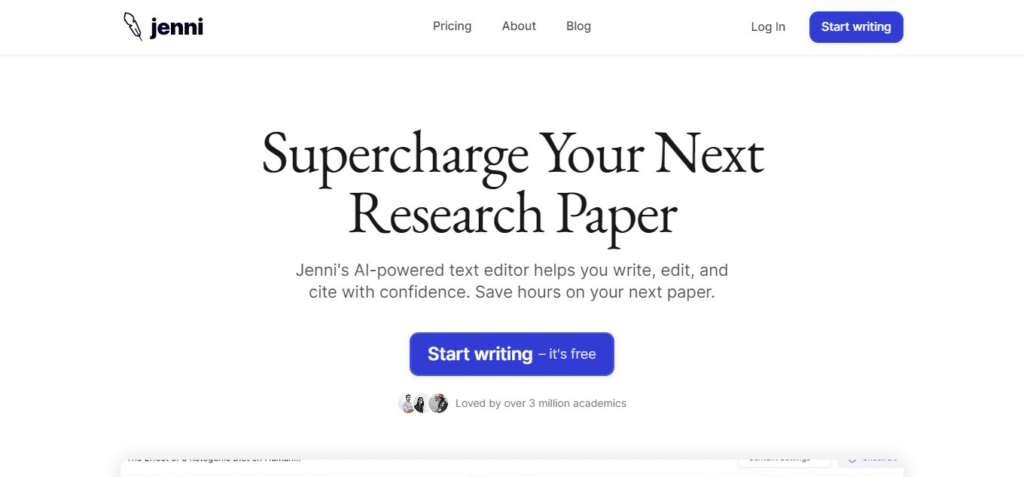
Data analysis, hypothesis testing, and knowledge discovery are made easier through an easy-to-use interface which can be customized according to one’s needs. This helps researchers identify hidden trends and patterns better while making decisions based on accurate information.
Collaboration is enhanced among researchers by allowing them communicate seamlessly with each other through this application thus fostering innovation and speeding up discoveries. Whether one is searching for relevant literature, analyzing data or working together with colleagues; Jenni will always come in handy as it helps them understand more about their area of specialization and contribute meaningfully towards it.
9. Paperpal
Paperpal is a very useful AI tool for scholars. It helps them with their research by giving them a complex platform where they can do all their work from beginning to end. Paperpal has advanced natural language processing (NLP) features that make it possible for users to simplify literature reviews through quickly identifying the main points in scholarly papers and other such materials.
The user-friendly design together with its intuitive functions allows researchers at any level easily organize, annotate as well analyze different types of study materials while saving time too.
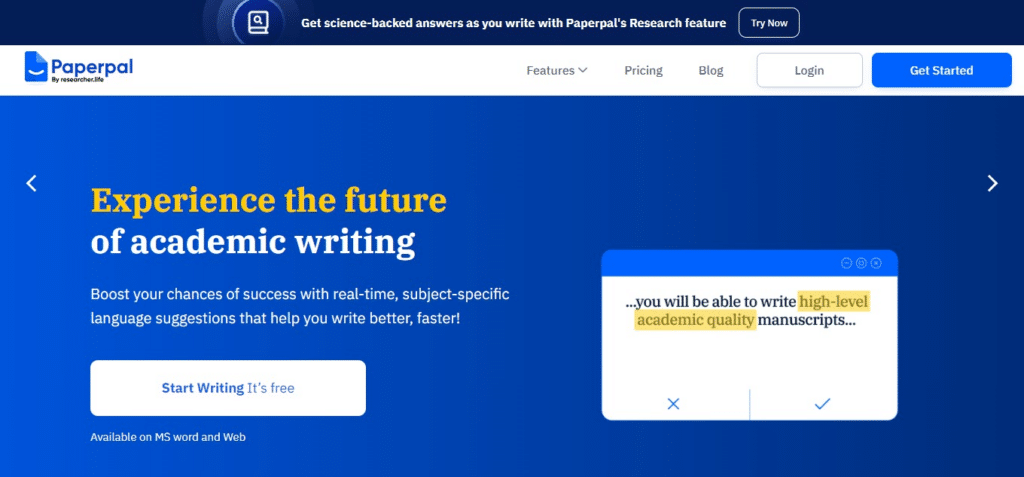
This app also enhances communication between different scientists working on the same project hence fostering innovation as well maximizing productivity among other benefits that come with teamwork especially in research institutions where individuals may have different areas of specialization but need each others’ contributions towards achieving common goals aimed at advancing knowledge in various fields of science including medicine,
engineering, agriculture etcetera; be it reviewing literature or analyzing data sets one needs tools like these which can help speed up this process thereby enabling them write more efficient research articles thus leading to faster scientific inquiry and discovery.
10. Research Rabbit
Research Rabbit is a powerful AI tool for researchers. It can change the game by providing a one-stop platform that can transform the research process as we know it. Through advanced algorithms, Research Rabbit scans through volumes of academic literature to find relevant papers, articles and resources on any given subject within no time.
This is made possible by an easy-to-use interface which allows different settings depending on what one wants from their search; this saves time spent reading irrelevant materials hence making work easier for those who wish only key points or summaries thereof..
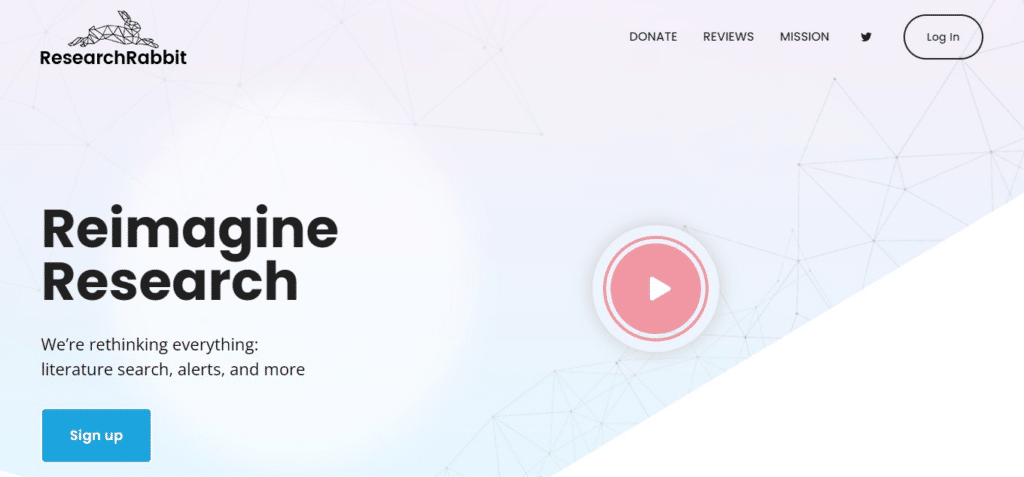
The current trends in any discipline are hard to keep up with but not when using Research Rabbit – it helps you do just that! What’s more, boring tasks such as managing citations become automated so that the researcher has more hours for thinking critically about things higher up Maslow’s hierarchy like self-actualization or enlightenment…
In addition, the tool fosters interdisciplinarity and innovation among scholars because they can now easily share knowledge across disciplines thanks to its collaborative nature. Whether one is looking for some background readings before embarking on data analysis;
whether there be need for inspiration during proposal writing sessions – no matter what kind of research endeavor you may find yourself undertaking at any given time – think about having “Research Rabbit” by your side always if meaningful contributions are supposed to be made within respective fields!
Factors to Consider when Choosing the Best AI Tools for Research
Several things need to be kept in mind while selecting the most suitable AI tools for research work.
Precision and Reliability: Accuracy and reliability should be evaluated depending on the algorithms applied and results produced by AI tools. It is preferable to use instruments that have undergone rigorous testing and verification accompanied by peer-reviewed studies which affirm their efficacy.
User-Friendliness: Take note of the user interface and usability when selecting an artificial intelligence tool for research purposes. Choose those ones that are easy to understand and operate, provide well-documented guides as well as necessary support materials for users.
Interoperability: Ensure that you choose an AI tool which can easily work together with data formats commonly used in your area of study, software platforms and systems. This will help integrate them into already established workflows hence maximizing efficiency.
Adaptability: The ability of an algorithm or workflow to fit into different research needs should be considered during selection among other factors associated with artificial intelligence tools. Tools allowing users to modify parameters, algorithms or workflows are more appropriate for specific research objectives.
Scalability: As a researcher, it is important to think about how big datasets may become over time due growth in scientific investigations thus requiring bigger storage capacities; hence one should go for scalable ai software solutions capable of handling these changes without compromising performance levels or affecting any other functions negatively.
Cost-effectiveness and inclusivity: Cost implications vis-a-vis funding realities must always be taken into account so as not overspend resources allocated towards carrying out a given study besides considering its accessibility among researchers from different backgrounds who might have limited access due lack institutional privileges support services currently available within their reach.
Helpdesk & upkeep: One should inquire about the availability support services including training opportunities provided by developers maintainers behind various programs under consideration during such stage awareness creation among potential users especially beginners conducting research activity using machine learning approaches could greatly assist them overcoming challenges encountered throughout implementation process leading successful completion projects carried out ethical manner.
Ethical Concerns: Take into account ethical issues surrounding the use of AI tools during research work mainly touching on privacy protection bias elimination and fairness as well transparency in algorithms employed.
What Are the Benefits of Using an AI Tool for Research?
Using AI for research has many advantages, such as:
Efficiency: AI tools can complete tasks faster than humans because they automate tedious jobs like data analysis, reading through numerous articles and citation management. This leaves the researchers with more time to concentrate on complex issues.
Accuracy: Machines are less likely to commit errors when handling large amounts of information during data interpretation or pattern recognition; therefore, AI algorithms process huge volumes of data accurately and consistently.
Insight Generation: Sometimes there are correlations in datasets that human beings cannot see easily but which artificial intelligence models can detect leading to new discoveries or lines of investigation.
Collaboration improvement: Platforms enhanced by Artificial Intelligence allow scientists work together better including real-time editing features among others such as shared document repositories and version control systems.
Ease of use: Many AI tools have interfaces that are designed for easy usage thus making them accessible even by those who do not have much technical knowledge in computing or come from different academic fields.
Scalability: Researchers can deal with big research projects involving lots of data sets coupled with complicated operations if they employ AI since these applications can scale up accordingly so as to handle such tasks unlike manual approaches alone which would make it impractical or impossible to achieve this.
Innovation promotion: Innovation often requires thinking outside the box but this is only possible when routine activities get automated thereby freeing up time for critical thinking, creativity and problem-solving.
Conclusion
Ultimately, the AI research landscape is teeming with opportunities to increase productivity, efficiency, and innovation in academic work. These programs can help scientists deal with difficult issues and come up with fresh ideas by using sophisticated algorithms and machine learning.
However, determining which AI tools are most appropriate involves thinking about accuracy, usability, compatibility, scalability as well as cost implications and ethical concerns too. What researchers need to do is choose those tools that best fit their goals for investigation and workflows while reflecting upon values so that they may realize all possible outcomes arising from utilizing AI towards impactful or even morally sound research findings.
As long artificial intelligence continues advancing rapidly alongside increased availability of such resources in future years; it will certainly be eye-opening times ahead for any knowledge-seeking person hoping not just understand everything but change things too!
FAQ
What are AI tools for research?
AI tools for research are software applications powered by artificial intelligence (AI) techniques that assist researchers in various aspects of their work, such as data analysis, literature review, and knowledge discovery.
How do AI tools benefit researchers?
AI tools offer several benefits to researchers, including increased efficiency, accuracy in data analysis, generation of insights from large datasets, enhanced collaboration, and scalability to handle complex research tasks.
What types of tasks can AI tools assist with in research?
AI tools can assist researchers with tasks such as literature review, data analysis, hypothesis testing, predictive modeling, citation management, document summarization, and trend analysis.
How do I choose the best AI tool for my research needs?
When selecting an AI tool for research, consider factors such as accuracy, usability, compatibility with existing workflows and systems, scalability, cost, support and maintenance, and ethical considerations.
Are AI tools accessible to researchers from all disciplines?
Yes, many AI tools for research are designed to be accessible to researchers from diverse disciplines and backgrounds. However, some tools may be more specialized or tailored to specific research domains.














